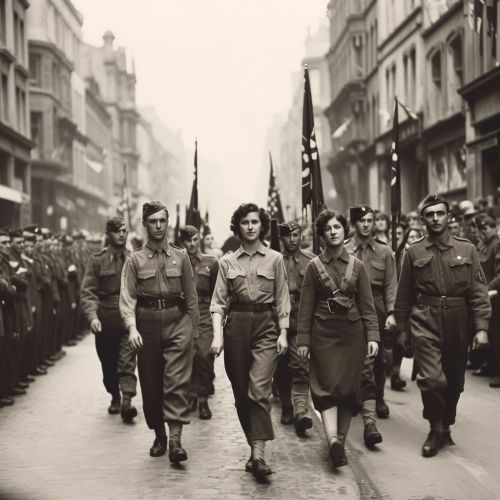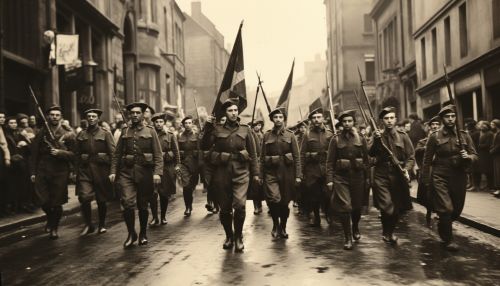International Brigades
Origins and Formation
The Spanish Civil War (1936-1939) was a significant event in the 20th century, marked by the involvement of various international entities. Among these were the International Brigades, a group of foreign volunteers who came to Spain to fight against the Nationalist forces led by General Francisco Franco. The International Brigades were formed in response to a call for assistance from the Second Spanish Republic, which was under threat from Franco's forces.


The International Brigades were largely organized by the Comintern (Communist International), a global organization that sought to promote international communism. The Comintern was instrumental in recruiting volunteers from various countries, providing a framework for their organization, and facilitating their transport to Spain.
Composition
The International Brigades comprised approximately 35,000 volunteers from over 50 countries. These volunteers were predominantly working-class individuals, many of whom were members of communist or socialist organizations in their home countries. The largest contingents came from France, Germany, and Italy, but there were also significant numbers from the United States, the United Kingdom, and other countries.
The Brigades were organized into battalions, each typically composed of volunteers from a particular country or region. These included the Abraham Lincoln Brigade (United States), the George Washington Battalion (United States), the Thälmann Battalion (Germany), and the Garibaldi Battalion (Italy), among others.
Role in the Spanish Civil War
The International Brigades played a significant role in several key battles during the Spanish Civil War. They were involved in the defense of Madrid in November 1936, where their arrival was a significant morale boost for the Republican forces. They also participated in the Battle of Jarama in February 1937, the Battle of Guadalajara in March 1937, and the Battle of the Ebro in July 1938, among others.
Despite their bravery and commitment, the Brigades were often poorly equipped and lacked adequate training. This, combined with the superior resources and organization of the Nationalist forces, resulted in heavy casualties for the International Brigades.
Withdrawal and Dissolution
In September 1938, in a bid to encourage non-interventionist countries to put pressure on Italy and Germany to withdraw their troops from Spain, the Spanish Republican government announced the withdrawal of the International Brigades. The last of the Brigades left Spain in December 1938, and the Brigades were officially dissolved in 1939.
Legacy
The International Brigades are remembered for their international solidarity and commitment to the cause of the Spanish Republic. They have been commemorated in various ways, including monuments, books, films, and songs. Despite their ultimate defeat, their efforts are seen as a significant example of international volunteerism in the face of fascism.
